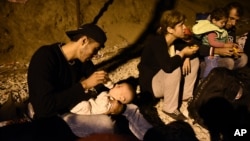The State Department said Thursday that the U.S. had stepped up efforts to process Syrian refugees seeking admission to the United States.
Spokesman Mark Toner said the total number of Syrian refugees admitted to the U.S. since the start of the country’s crisis in 2011 was expected to reach about 1,800 by the end of October.
He commented after photographs emerged showing the body of a 3-year-old Syrian refugee who drowned off the coast of Greece. The child’s mother and brother were also among those who died after their boat capsized.
Toner said officials were “shocked” by the “graphic and heartbreaking images” emerging from the crisis in Europe, which is grappling to deal with one of its biggest migrant streams since World War II.
Need for protection
He said one U.S. challenge for admitting migrants from countries such as Syria is the U.S. review process, which can take up to 24 months.
“There are a lot of terrorist groups operating in that region, in that part of the world,” said Toner. “We need to make sure that we fundamentally protect the national security of the United States.”
He said the U.S. had “put more resources” behind the background checks. He also said the U.S. had provided more than $4 billion in humanitarian assistance since the start of the Syrian crisis.
Toner said that what's ultimately needed is a political resolution to the conflict in Syria that includes the departure of President Bashar al-Assad and the defeat of the Islamic State militant group.
“We need to create an environment where these refugees can ultimately return home, which is where they want to be,” he said.
Calls for US action
Human Rights Watch Refugee Program Director Bill Frelick agreed that the root cause of the refugee crisis should be addressed, but he said the U.S. and other nations needed to do more in the meantime.
“You can’t use that as an excuse for not taking this necessary step in the interim to protect people and to provide for their humanitarian needs,” he said.
Frelick said the U.S. needed to provide more money to the United Nations, which has said its efforts to address the Syrian refugee crisis are significantly underfunded.
The U.N. refugee agency said that overall, more than 300,000 refugees and migrants have crossed the Mediterranean so far this year, with most of them initially landing in Greece. It said that figure compared with a total of about 219,000 refugees arriving in the region during all of 2014.
Meanwhile, the International Rescue Committee relief organization urged the U.S. to increase the number of Syrian refugees that it is willing to resettle to 65,000 by the end of next year.
“The U.S. has historically been a world leader in recognizing the moral obligation to resettle refugees,” said IRC President David Miliband. “As the German government calmly says that it expects 800,000 refugees and asylum seekers in 2015, it is vital for the U.S. to step up its response.”
Some U.S. lawmakers have also called for an increased U.S. response.
In a June letter to President Barack Obama, 14 senators said, “It is a moral, legal and national security imperative for the United States to lead by example in addressing the world’s worst refugee crisis of our time by greatly increasing the number of Syrian refugees who are resettled in our country.”
Some concerns
However, other lawmakers have voiced concerns. Several Republican lawmakers wrote to national security adviser Susan Rice earlier this year, urging against any U.S. surge in Syrian resettlements because of “national security concerns.”
The European Union is moving to step up its response to the refugee crisis, which is having the biggest impact on Greece, Italy and Hungary.
The 28-nation block is set to hold an emergency meeting on the situation September 14.




